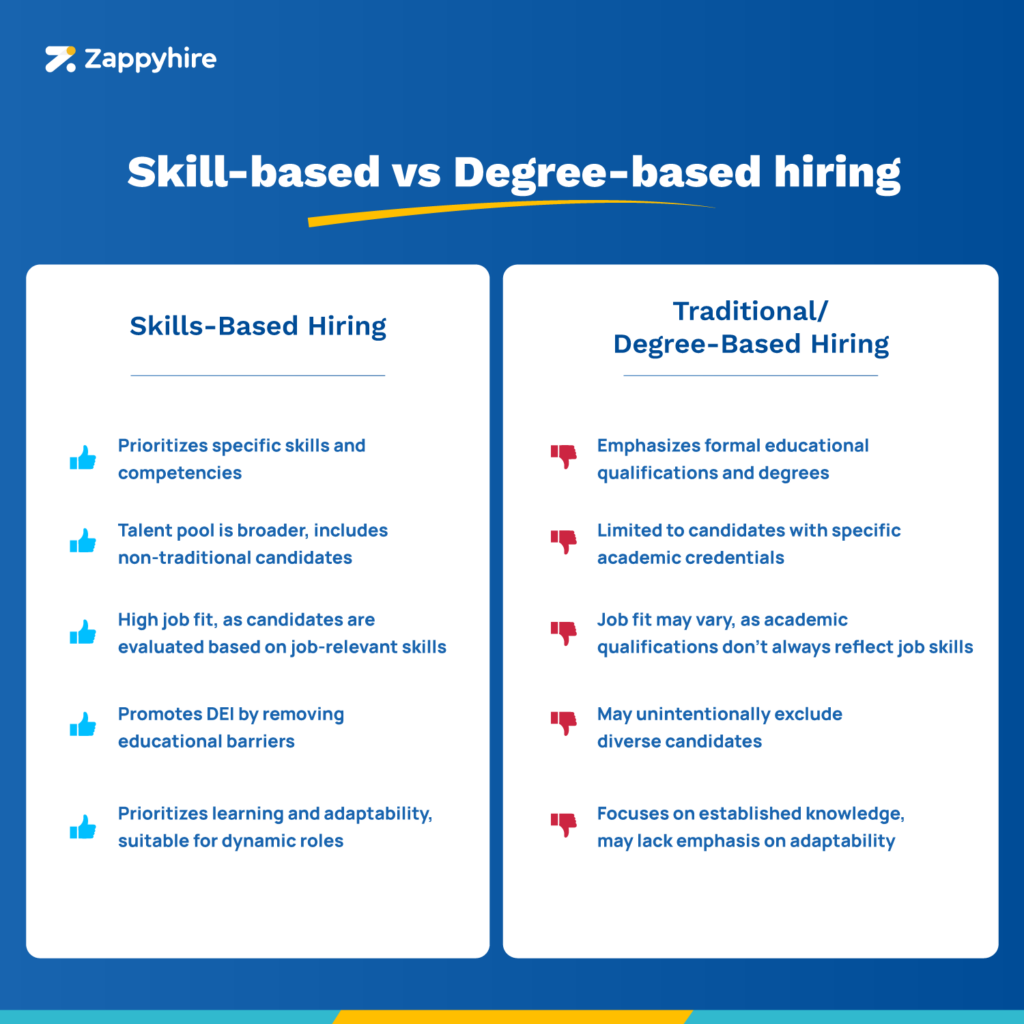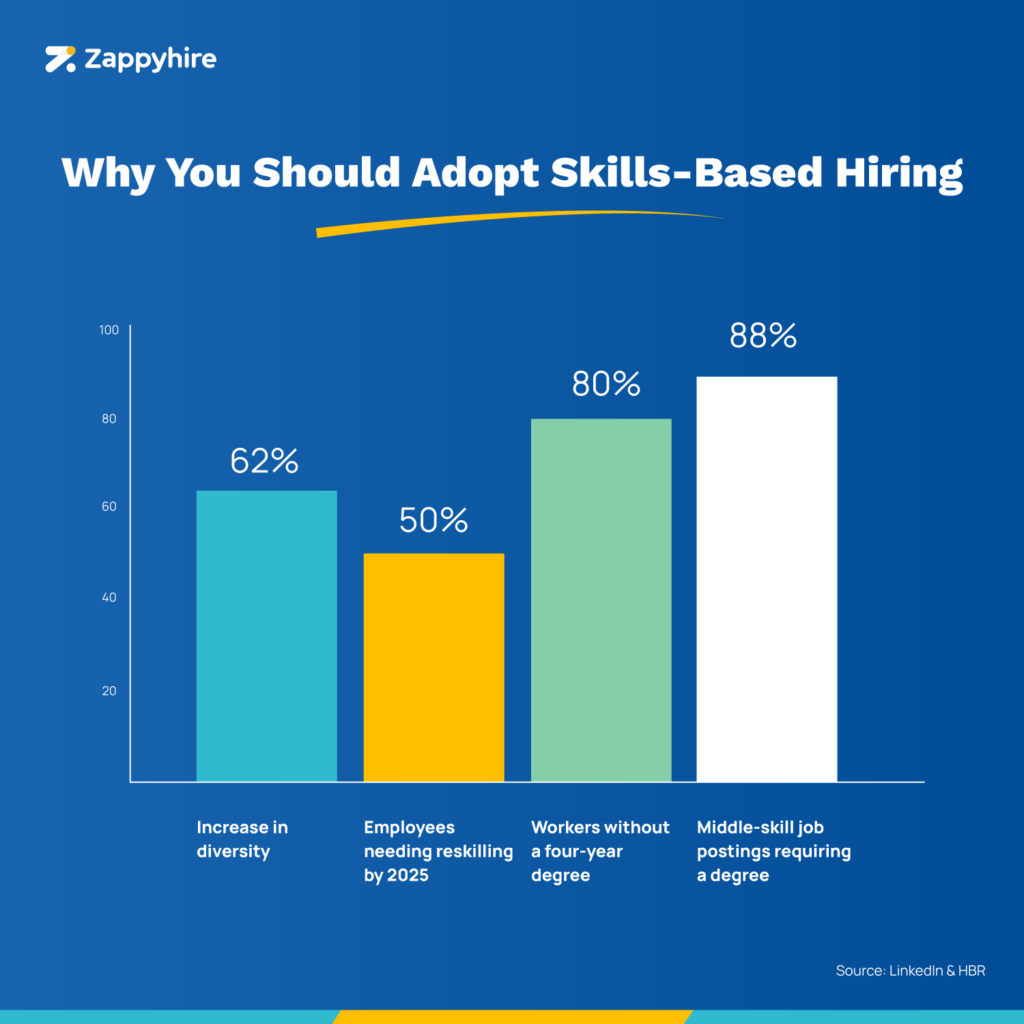
The traditional reliance on academic degrees as the primary measure of a candidate’s potential is giving way to a more holistic approach – skills-based hiring.
Recent statistics highlight the growing adoption of skills-based hiring practices, with 73% of recruiting professionals considering it a priority for attracting and retaining talent, especially among the Gen Z workforce.
What is skills-based hiring?
Skills-based hiring is a recruitment strategy that prioritizes candidates’ skills and competencies over formal qualifications such as degrees or years of experience.
It involves identifying the specific skills required for a job and assessing candidates based on their ability to perform those tasks.
This approach is gaining popularity as it opens up opportunities for a wider pool of talent, including those who may have acquired their skills through non-traditional paths.
This method is particularly effective in addressing the skills gap, as it allows employers to focus on the specific competencies needed for a job.
What are some examples of skills-based hiring?
Companies often prioritize coding skills, proficiency in programming languages (e.g., Python, Java, JavaScript), and experience with software development frameworks.
For example, a tech firm might prefer a candidate who has a strong portfolio of coding projects and contributions to open-source software over someone with just a computer science degree.
In terms of digital marketing, companies nowadays focus on skills such as content creation, social media management, SEO expertise, and data analysis.
A candidate with a proven track record of successful marketing campaigns and a strong online presence might be favored over someone with a degree in marketing but limited practical experience.
Skills-based hiring vs degree-based hiring
The traditional degree-based hiring model has long been the standard, with a focus on academic credentials as a primary indicator of a candidate’s potential.
However, this approach often overlooks talented individuals who may not have pursued formal education but possess the necessary skills and experience.

Skills-based hiring offers a more flexible and inclusive approach. It recognizes that valuable skills can be acquired through various means, including self-learning, vocational training, and real-world experience.
By focusing on what candidates can do, rather than where they studied, recruiters can uncover hidden gems in the talent pool.
What are the benefits of skills-based hiring?
It emphasizes the capabilities and talents of individuals, creating a more personalized and effective approach to recruitment. By valuing skills above traditional credentials, this method promotes a more inclusive and adaptable recruitment environment.
A broader talent pool
By not restricting the search to candidates with specific degrees, recruiters can access a wider range of talent.
According to LinkedIn, employees without a four-year degree stay at companies 34% longer than those with such a degree.
Improved job fit
Focusing on skills ensures that candidates are evaluated based on their ability to perform the job, leading to better matches and potentially higher job satisfaction and retention.
Diversity, Equity, and Inclusion (DEI)
This approach promotes DEI by reducing biases associated with educational and socio-economic backgrounds.
A LinkedIn report found that 62% of hiring managers believe this approach increases diversity.
Adaptability
In a rapidly changing job market, skills-based hiring enables organizations to adapt more easily by prioritizing transferable skills.
Better performance and lower turnover
Employees hired based on their skills are more likely to excel in their roles and stay with the company longer.

Why is skills-based hiring important?
At a glance, skills-based hiring is important due to the following reasons
- Skills-based hiring benefits workers across different generations.
- It promotes diversity by providing opportunities for underrepresented demographics.
- Several industries stand to significantly increase their talent pools by adopting a skills-first approach to hiring.
- Skills-based hiring is vital as it aligns with the evolving needs of the contemporary workplace, where technological advancements necessitate a workforce capable of rapid skill acquisition and adaptation.

The importance of skills-based hiring lies in its alignment with the demands of the modern workplace. In an era where technological advancements are constant, the half-life of skills is shorter than ever.
The World Economic Forum estimates that 50% of all employees will need reskilling by 2025. Skills-based hiring not only addresses the current skills gap but also prepares organizations for future challenges by focusing on the adaptability and continuous learning of their workforce.
Additional statistics from LinkedIn reveal that the skills employees need for a given position have shifted by around 25% since 2015 and are expected to double by 2027. Expanding the talent search to include workers with relevant skills led to a 10X increase in eligible workers across all jobs.
Industries such as Education, Consumer Services, Retail, and Administrative and Support Services could increase their talent pool up to 20x with a skills-first approach.
Globally, a skills-first approach to hiring on average increases the talent pool of workers without bachelor’s degrees by 9% more than for workers with degrees.
In jobs where women are underrepresented, the proportion of women in the talent pool would increase 24% more than it would for men with a skills-first approach.
Plus, it increases the talent pool for Gen X workers by 8.5x, 9x for Millennial workers, and 10.3x for Gen Z workers.
How to implement skills-based hiring practices
Adopting a skills-based hiring approach not only benefits your company by bringing in the right talent but also contributes to a fairer and more equitable job market.
By taking these steps, you can humanize your hiring process and create a more inclusive, skill-focused environment.
- Start by revisiting your job descriptions
Instead of focusing on degrees and years of experience, highlight the specific skills and competencies required for the role.
Use clear, understandable language that speaks to the heart of what the job entails. This encourages a wider range of applicants and helps you find the right fit.

- Look beyond traditional recruitment criteria
Consider candidates from non-traditional backgrounds, such as vocational schools, boot camps, or online courses. This opens the door to a wider pool of talent with diverse skill sets.
- Incorporate practical assessments into your hiring process
This can include work samples, simulations, or skill tests. It’s a way to see candidates in action and gauge their abilities in real-world scenarios.
- Encourage a growth mindset within your organization
Offer opportunities for existing employees to learn and develop new skills. This not only supports your skills-based hiring approach but also promotes a culture of continuous improvement.
- Leverage technology to support your skills-based hiring
Applicant tracking systems (ATS) with advanced AI features can help you screen and identify candidates based on their skills, making the process more efficient and objective.
- Educate your hiring team about the benefits of skills-based hiring
Provide training on how to assess skills effectively and how to conduct interviews that focus on competencies rather than credentials.
- Share your commitment to skills-based hiring with your team and candidates
This helps set expectations and attracts candidates who align with your values. Highlight how this approach aligns with your company’s values and goals. This transparency builds trust and attracts like-minded individuals.
Why skills-based hiring is on the rise
Harvard Business School’s report highlights that 88% of hirers agree that they are filtering out highly skilled candidates just because they lack traditional credentials such as past job titles or degrees.
However, companies that purposefully hire hidden workers report being 36% less likely to face talent and skills shortages compared to companies that do not hire hidden workers.
Former hidden workers outperform their peers on six key evaluative criteria: attitude and work ethic, productivity, quality of work, engagement, attendance, and innovation.
Let’s explore the aspects that culminated in facilitating the rise of skills-based hiring.
- Gig economy
The gig economy, characterized by short-term contracts and freelance work, prioritizes specific skills for particular projects. This trend has nudged companies to value practical abilities over traditional, long-term job experiences, making skills-based hiring more relevant.
- Agile workplaces
Modern businesses are embracing agility, requiring employees who can swiftly adapt to changes and take on various roles. Skills-based hiring helps identify individuals with a diverse skill set, ensuring a workforce that can thrive in a dynamic environment.
- Career changers
The job market is witnessing an influx of career changers, bringing a wealth of transferable skills from different sectors. Skills-based hiring opens doors for these individuals, allowing employers to benefit from their diverse experiences and perspectives.
- Digital transformation
As technology evolves, so do the skills needed to keep pace. Companies are focusing on hiring individuals who can quickly learn and master new digital tools, making adaptability and continuous learning more crucial than ever.
- The rise of soft skills
In today’s collaborative work culture, soft skills like effective communication, critical thinking, and teamwork are in high demand. Skills-based hiring helps identify candidates who excel in these areas, contributing to a more harmonious and productive workplace.
- Customized roles
Businesses are moving away from generic job descriptions, designing roles that align with specific skill sets.
This approach allows for a more targeted and efficient hiring process, ensuring that each role is filled with the right expertise.
Skills-based hiring is a win-win for all
The rise of skills-based hiring is a response to the changing dynamics of the workforce and the economy – and it’s a win-win for employers and employees alike.
For companies, it means accessing a wider talent pool, reducing turnover, and enhancing productivity.
For workers, it means more opportunities, a fairer shot at success, and a clearer path for career growth. When we focus on skills, we’re not just filling jobs – we’re building more resilient, innovative, and dynamic teams.
It’s a call to action for all of us – employers, recruiters, and policymakers – to embrace a more inclusive and effective way of matching talent with opportunity. It’s a plea to recognize the potential in every individual, to value diversity, and to adapt to the needs of the future.





